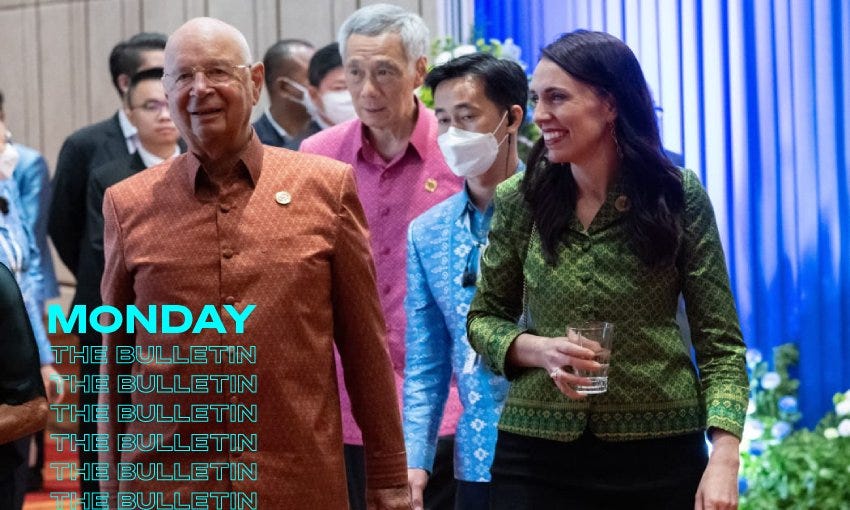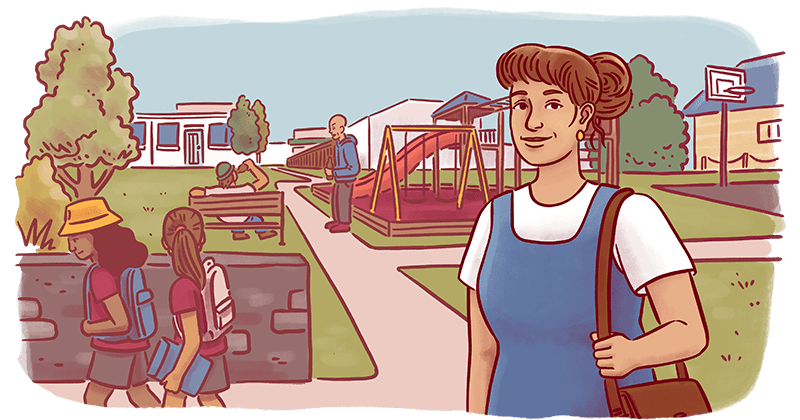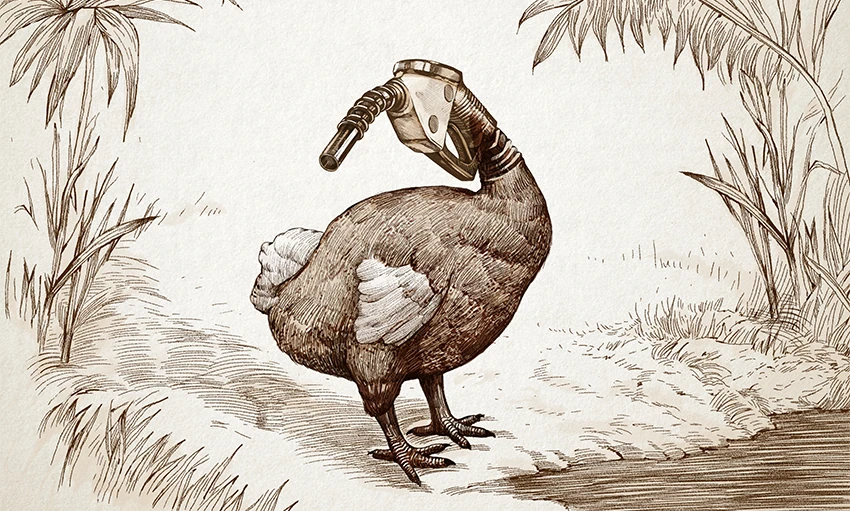All eyes on East Asia as global leaders converge
The next two weeks sees global leaders meet at three summits in Cambodia, Indonesia and Thailand. Ardern will attend two of them, while it looks like Vladimir Putin will attend none
Mōrena and welcome to The Bulletin for Monday, November 14, by Anna Rawhiti-Connell. Presented in partnership with Z Energy.
In today’s edition: government considering paying student nurses; New Zealanders split on banning alcohol sponsorship in sport; changes to Three Waters; but first; your guide to three major global leaders’ summits
Jacinda Ardern arrives at the summit dinner in Phnom Penh (Photo: RNZ/AFP)
EAS the first of three major summits in East Asia
Just when you thought you’d familiarised yourself with Cop27 as a frequently occurring news acronym (FONA?), we’re now into a jam-packed couple of weeks of acronymic leaders’ forums in South-East Asia. Here’s your rough guide. The first is the East Asian Summit (EAS) in Cambodia –a meeting of the 10 South East Asian countries which form the Association of Southeast Asian Nations (ASEAN), plus eight other countries with interests in the region including the US, Australia, New Zealand, China and Russia. Prime Minister Jacinda Ardern has just wrapped up her time at the EAS, releasing her speech this morning. We secured an upgraded trade deal with ASEAN. As Ardern said, “We now trade more with ASEAN in a week than we did in a year in the early 1970s.”
Condemnation of military rule and executions in Myanmar
EAS attendees included US president Joe Biden and Australian prime minister, Anthony Albanese. Vladimir Putin did not attend. Ardern had a chat with Biden, with a great shot of the “sharp elbows” required to do so from the Herald here (paywalled). Ardern's EAS agenda items were top of the list for most attendees –the ongoing war in Ukraine, inflation, global economic instability and the rule of Myanmar by a military junta. Ardern reiterated her criticism of military rule in Myanmar, calling the execution of opponents “devastating and a stain on our region”. With no apparent progress on peace and the recent extension of emergency rule in Myanmar until 2023, ASEAN leaders pressed for "concrete, practical and measurable indicators with a specific timeline" on Friday night.
G-20, APEC to follow EAS, Ardern will lead trade delegation to Viet Nam
In a scheduling move that feels a bit like putting kids in a room until they sort out their problems but is probably about cramming in as much face-to-face time in one region as possible, the EAS is followed by a G-20 meeting in Bali and then the Asia-Pacific Economic Cooperation (APEC) leaders’ week in Thailand. New Zealand isn’t part of the G-20 so Ardern will lead a trade delegation to Viet Nam, a market worth more than $2 billion a year in trade. Ardern then heads to APEC where a meeting with Xi could be on the cards.
Biden to skip APEC leaders’ meeting
Biden is set to meet Xi at the G-20, as he’s not attending the APEC leaders’ meeting. Plenty of eyes on that meeting and a few raised eyebrows about Biden’s non-attendance at the APEC meeting. Vice-president Kamala Harris will attend instead. Politico has a good rundown on Biden’s challenge in the region as many countries remain sceptical about the big promises the US has made about its commitment to the region. Albanese is seeking a meeting with Xi, with no “preconditions”. Putin will reportedly be a no-show at the G-20 and APEC.
How do alcohol licences get granted against community will?
Statistics show low-income areas of New Zealand have a higher density of liquor stores. Now, a study from Massey University’s SHORE & Whariki Research Centre has tracked some of the harmful effects of this, and why even when the community tries to voice their concerns, alcohol licences are often still granted. Read more about the research, and why the alcohol licensing system needs to be reformed on The Spinoff now (sponsored).
Government considering paying student nurses for hospital placements
As the Herald reports this morning, health minister Andrew Little wants student nurses to be paid for hospital placements “as soon as possible”, with officials actively considering significant reforms. To become a registered nurse in New Zealand, students must complete 1,100 hours of placements in hospitals and ‘real’ clinical settings. That work is currently unpaid. Little said the placement stage is “where we see the biggest drop-off of nursing students”. National’s health spokesman Shane Reti was sceptical of the approach and questioned whether it would set a precedent for others like medical school students. Med students receive a $26,756 government stipend during their internship in their sixth year.
Poll splits New Zealanders down the middle on alcohol sponsorship in sport
As well as polling on political parties, the main news network polls will sometimes also poll on issues. The bulk of results from the latest Newshub Reid Research poll were released last week, but over the weekend, Newhub released the results on the question of whether alcohol sponsorship in sport should be banned. 44% said yes, 44.3% said no, while the remainder didn’t know. The question of how much money would be lost to sports clubs if alcohol sponsorship was banned remains up in the air, with the figures being used dating back to 2015.
A message from The Spinoff’s founder and publisher, Duncan Greive
The Bulletin’s readers are the bedrock of The Spinoff, a community of nearly 40,000 who read Anna’s work every day and rely on it to help understand this country. We at The Spinoff rely on our audience too – you are by far our largest funders, and the only reason we exist at all.
I’m here to ask you for your help again. The cost of living crisis, which we have covered extensively, has hit us and our people too – at the same time as membership income has remained flat post-pandemic. Big tech has taken over the digital advertising market, making us need your donations now more than ever.
As we head into an election year in 2023, and with rumours of Rupert Murdoch returning to NZ surfacing, I would love it if you would consider donating to help keep our independent, NZ owned and made journalism free for all. Please support The Spinoff today.
Three Waters changes agreed to, National to reveal policy closer to election
The government has agreed to make changes to its Three Waters reforms following recommendations from a Select Committee. Over 80,000 submissions were received by the Select Committee on the Water Services Entities Bill. The co-governance aspect of the reform has survived. National MP Simon Watts told TVNZ’s Q+A on Sunday that the party agrees there needs to be reform, but it opposes the government's current proposals. Host Jack Tame pressed Watts pretty hard on what National’s alternative model would be, citing the plan presented by the mayors of Auckland, Christchurch and Waimakariri just three weeks after their election. Watts said National would reveal its policy closer to the election.
Click and collect
Four major hospital upgrade projects in South Island face uncertainty
Good behind the scenes (paywalled) of Wayne Brown and Efeso Collins’ mayoral campaigns from the Herald’s Simon Wilson
Government wants to know how Aucklanders would like to next travel across the harbour
Democrats secure the Senate with win in Nevada, balance in House still undecided
Got some feedback about The Bulletin, or anything in the news? Get in touch with me at thebulletin@thespinoff.co.nz.
If you liked what you read today, share The Bulletin with friends, family and colleagues.
Justin Lester reveals new analysis showing the breathtaking speed with which New Zealand has adopted low emission vehicles; Duncan Greive shares 10 takeaways from TVNZ’s recent industry upfronts, and what they tell us about the upcoming merger; Anke Richter looks back at a weird weekend at ‘orgasmic meditation’ retreat OneTaste; Madeleine Chapman celebrates 10 incredible moments from the RWC final; and legally blind runner Michael Whittaker describes the euphoria of completing the Auckland half-marathon (and incredibly fast too).
Post-mortem Monday
Look, it’s really just been a bonanza of Black Ferns news over the last 36 hours following one of the greatest games of rugby I’ve ever watched and their Rugby World cup final win over England. I went from crying as Dame Hinewehi Mohi sung the anthem a capella, to yelling after Portia Woodman’s nasty head clash with Lydia Thompson.
Thought this was a useful review of Hollie Davidson’s decisions in light of the red card and I don’t know if this is a new development but those crosses to Ben Whitehouse, the TMO included in the television coverage added a dimension of transparency to the big calls.
Unfortunately Woodman remembers nothing of Saturday night’s game. We do, though. It was record breaking in at least two ways: crowd size for a women’s rugby event and the free-to-air broaccast gained a record-breaking 64.9% share of viewers for Three.
I thought I’d witnessed the greatest display of emotion we’d ever get from Sir Graeme Henry during the 2011 Rugby World cup final against France – his face went from :-| to this >:-| after Trinh-Duc converted the French try. He’s proven we know nothing of his capacity for deep joy in this video where he can be seen dancing with the Blacks Ferns in the changing rooms.
Elsewhere:
This morning the All Blacks beat Scotland at Murrayfield in Edinburgh in what’s being described as an unconvincing win. Tries from Mark Telea and Scott Barrett sealed the deal, with veteran campaigner TJ Perenara calming the farm in the last minute of play to put paid to a last-ditch attack from Scotland.
More scenes of joy on the streets of Auckland as Sāmoa beat England in the Rugby League World Cup semi-final.
Joelle King took out the New Zealand Squash Open, while Commonwealth Games champion and World no. 2, Paul Coll lost his final to Mohammed El Shorbagy.










